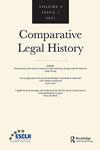共享的职业空间:古巴和墨西哥的殖民地律师网络(1508-1832)
IF 0.5
Q2 LAW
引用次数: 0
摘要
在殖民时期,墨西哥和古巴的法律专业人员保持着密切的关系。法律专家抵达美国加入殖民统治,但定居者之间的过度诉讼迫使王室禁止海外律师。然而,拥有法律学位的官员占据市政职位变得越来越必要,因此,西班牙创建了殖民地大学。古巴学生越来越多地在墨西哥学习法律,毕业后加入了整个西班牙帝国的专业网络。1728年哈瓦那大学的成立进一步加强了古巴和墨西哥之间的知识联系。1760年,墨西哥精英创建了一个基于血统、种族和阶级的严格会员要求的Abogados律师事务所,哈瓦那的律师于1812年提交了一份请愿书,要求开设自己的律师事务所,以保持法律职业的排他性。本文章由计算机程序翻译,如有差异,请以英文原文为准。
A shared professional space: networks of colonial lawyers in Cuba and Mexico (1508–1832)
During the colonial period, legal professionals from Mexico and Cuba maintained a closed relationship. Legal experts arrived in America to join the colonial establishment, but excessive litigiousness among settlers forced the Crown to forbid lawyers from overseas. However, it became increasingly necessary for functionaries to hold law degrees to occupy municipal positions, and thus, Spain created colonial universities. Cuban students increasingly studied law in Mexico and, upon graduation, joined the professional network across the Spanish Empire. The foundation of the University of Havana in 1728 further strengthened the intellectual connections between Cuba and Mexico. In 1760, Mexican elites created a Colegio de Abogados with strict membership requirements based on lineage, race, and class, and lawyers in Havana submitted a petition to open their own Colegio in 1812 to preserve the exclusivity of the legal professions.
求助全文
通过发布文献求助,成功后即可免费获取论文全文。
去求助
来源期刊
CiteScore
1.70
自引率
0.00%
发文量
20
期刊介绍:
Comparative Legal History is an international and comparative review of law and history. Articles will explore both ''internal'' legal history (doctrinal and disciplinary developments in the law) and ''external'' legal history (legal ideas and institutions in wider contexts). Rooted in the complexity of the various Western legal traditions worldwide, the journal will also investigate other laws and customs from around the globe. Comparisons may be either temporal or geographical and both legal and other law-like normative traditions will be considered. Scholarship on comparative and trans-national historiography, including trans-disciplinary approaches, is particularly welcome.

 求助内容:
求助内容: 应助结果提醒方式:
应助结果提醒方式:


